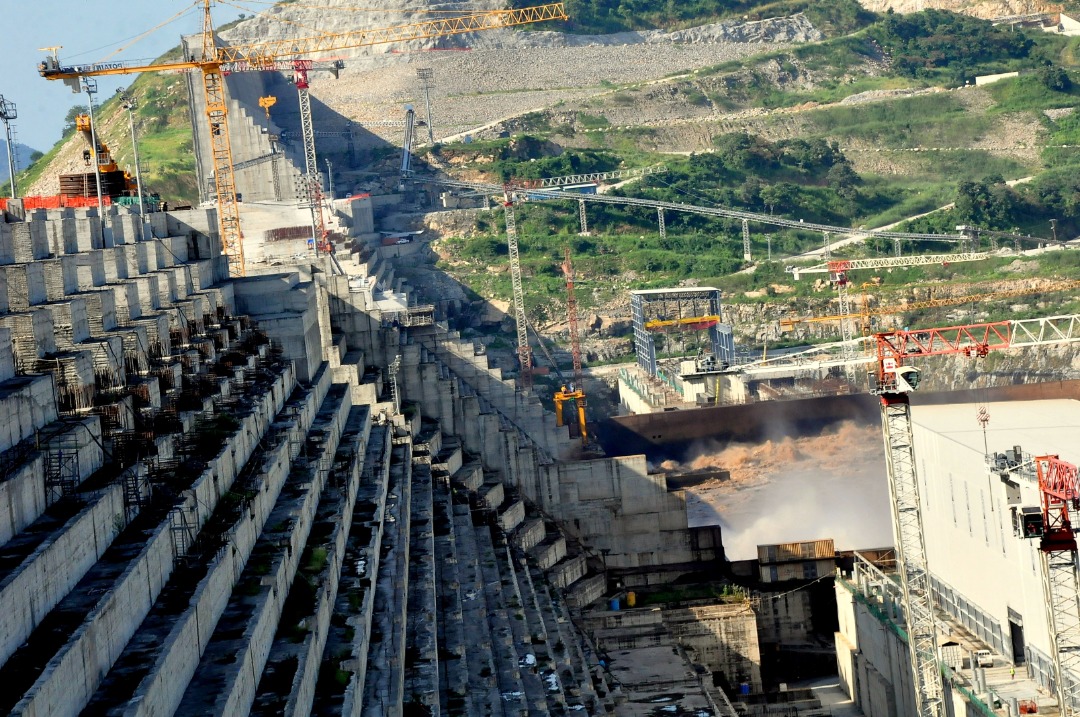
Following the referring of the Grand Ethiopian Renaissance Dam (GERD) issue to the United Nations Security Council (UNSC), the international community is breaking its silence and recognizing the importance of GERD for Ethiopia. The international community and international organizations are calling the parties to reach win-win agreement through table negotiation by themselves, which is the firm stance of Ethiopia so far.
This week, the UN Secretary-General, the European Union, African Ambassadors resident in Addis Ababa, US based human right activist are few among those heard their voice on the issue of GERD.
According to FBC, the European Union (EU) recognizes the strategic importance of the Nile waters and GERD for Ethiopia. European Commission and European Council presidents encouraged all partiers to continue engaging with a view to find a mutually beneficial agreement.
The EU leaders had followed closely the tripartite talks so far and call the parties for cooperative relationship on the basis of mutual trust, which is essential for the entire region and expressed that EU is committed to support the parties to reach final win-win agreement with sharing expertise on trans-boundary water management.
The United Nations Secretary-General Antonio Gutters on his statement this week calls to Ethiopia, Sudan and Egypt “to achieve a mutually beneficial agreement”.
The Secretary-General underscores “the importance of the 2015 Declaration of Principles on the GERD, which emphasizes cooperation based on common understanding, mutual benefit, good faith, win-win, and the principles of international law”. Gutteres calls the parties to reach “an amicable agreement in accordance with the spirit of these Principles”.
On the other hand, the U.S. based Rainbow Push Coalition hated the Egypt’s hegemony over the Nile water with the unacceptable colonial treaties. According to a letter written by the founder and president of the coalition to US Congressional Black Caucus, Egypt’s letter to UNSC to push Ethiopia to accept the colonial treaties is illegal and Egypt’s claims are unfounded morally and legally.
According to the letter of the coalition, “Ethiopia has done everything in accordance with international water laws; the heart of the Ethio-Egypt problem is a colonial legacy that Egypt is trying to hang on to”. Since Ethiopia is the source of 85 percent of the Nile waters and Egypt contributes zero per cent to the flow”, the letter pointed out, “this is inexplicable”.
“Annually, the Nile River flows 84 billion cubic meters of water, of which Egypt gets 66 percent, Sudan gets 22 percent and the remaining 12 percent is lost to seepage and evaporation based on the 1959 colonial agreement”, the coalition’s letter noted. Despite all this mountain evidences, to the contrary on its letter to the UNSC, “Egypt falsely claims ‘at no point in its history has Egypt sought to obstruct the implementation of water projects by its co-riparian countries”.
One of the requests Egypt included in its letter to the UNSC is to stop Ethiopia from filling the reservoir for the GERD adding that “this is a brazen reflection of Egypt’s hegemonic attitude”, the letter reiterated.
The Coalition then requested the congress to pass a strong resolution as soon as possible to counter the colonial treaty claims of Egypt. The coalition also calls the international community and international organizations to stand for international principles of fair and equitable utilizations of common resources than becoming a tool to keep the interest of the powerful with false claims.
During a briefing forum on GERD to African resident Ambassadors in Addis Ababa this week, the ambassadors also stated that “Nile is a common heritage of mankind in the riparian countries”. One African Ambassador at the discussion forum said that “negotiations are not the best ways to go, they are the only way out of that situation” to reach fair and final win-win agreement.
According to the Ambassadors, the best way to reach final agreement is on the hand of the parties, but if third party is needed, as the founding fathers of Organization of African Union (OAU)/AU, Ethiopia and Egypt should bring the issue to Africa and calling Africa based institutions. The urged that “African solutions for African problems” is the best way than “inviting too many foreign entities on this issue”.
The Ethiopian Herald May 23/2020 BY DARGIE KAHSAY
Dignitaries insist on Dialogue to settle GERD dispute

The Ministry of Foreign Affairs of Ethiopia and the Ministry of Water, Irrigation and Electricity on Tuesday gave briefings about the construction, filling and operation of the Grand Ethiopian Renaissance Dam (GERD) as well as the various trilateral meetings held with Egypt and Sudan to African, Asian and Middle Eastern countries ambassadors residing in Addis Ababa.
Ethiopia and Egypt have failed to agree on the filling period with both countries accusing each other of being stiff in their conditions. Ethiopian Prime Minister Abiy Ahmed proposed a “first stage filling” strategy that would allow GERD reservoir to retain 18.4 billion cubic meters of water over a two-year period.
Minister of Water, Irrigation and Electricity, Dr. Eng. Seleshi Bekele and State Minister of the Foreign Affairs of Ethiopia, Minister of the Foreign Affairs of Ethiopia Gedu Andargachew Eng. Gedion Asfaw, and Redwan Hussein gave the briefings. The national, regional, and continental level values that can be gained in building the dam have been explained in the presentation.
The presenters also stressed Ethiopia’s commitment to equitably and reasonably utilize its water resources in line with accepted principles of ‘causing no significant harm’ as well as cooperation. Following the briefing, the Ambassadors thanked the presenters for clarifying cloudy issues regarding the dam and stressed on dialogue as the only option to solve contentious issues.
Ethiopia has said it will continue with its plans to fill its dam from July, despite Egypt’s claim that the move could lead to instability. In a letter to the UN Security Council Ethiopia’s Foreign Affairs Minister Gedu Andargachew said that Ethiopia “does not have legal obligation” to seek Egypt’s approval to fill GERD.
Gedu was responding to Egypt’s recent complaint to UN Security Council in which Cairo sought the intervention of the UN executive body to stop Ethiopia’s plan to start filling what would be Africa’s largest power dam.
They further called on the need to solve African problems through Africans highlighting that countries in Africa or the African Union can mediate the GERD talks whenever necessary.
Minister of the Foreign Affairs of Ethiopia Gedu Andargachew and Eng. Gedion Asafaw on Wednesday also briefed Asia Pacific and Middle Eastern Countries’ resident Ambassadors in Addis Ababa about the construction, filling and operation of the Grand Ethiopian Renaissance Dam.
The presenters expressed Ethiopia’s belief in dialogue highlighting the country’s willingness to go to an extra mile to make the tripartite talks among Ethiopia, Sudan and Egypt successful. Gedu and Eng. Gedion reiterated Ethiopia’s commitment to equitably and reasonably utilize its water resources in line with the accepted principles of causing no harm and cooperation. The Ambassadors said controversial issues regarding GERD should be solved only through dialogue.
Minister of the Foreign Affairs of Ethiopia Gedu Andargachew also discussed with United Kingdom’s Minister for Africa, James Duddridge on Wednesday held a video-conference call to discuss bilateral and regional issues between the two countries.
Gedu gave briefings about Ethiopia’s stance on the GERD and reiterated the importance of returning back to the trilateral talks among Ethiopia, Sudan and Egypt since dialogue is the only viable option to solve disputable issues. Mr. Duddridge also said issues regarding the GERD should be solved through dialogue.
The Secretary-General of the United Nations, António Guterres on Tuesday issued a statement on the Grand Ethiopian Renaissance Dam (GERD) calling on Ethiopia, Sudan and Egypt to peacefully solve issues through dialogue along with the spirits of the 2015 Declaration of Principles on the GERD.
Noting the good progress in the negotiations between Ethiopia, Sudan and Egypt, Guterres “encourages the three parties to persevere with efforts to peacefully resolve any remaining differences and to achieve a mutually beneficial agreement,” the statement said.
According to the statement, “The Secretary-General underscores the importance of the 2015 Declaration of Principles on the GERD, which emphasizes cooperation based on common understanding, mutual benefit, good faith, win-win, and the principles of international law.”
Mr. Guterres encourages progress towards an amicable agreement in accordance with the spirit of these Principles the statement added. It is known that the Declaration of Principles on the GERD emphasizes the equitable and reasonable utilization of the Nile water resources in line with accepted principles of ‘causing no significant harm’ as well as cooperation.
The European Union (EU) also said it fully recognizes the strategic importance of the Nile waters and the GERD for Ethiopia. European Commission President, Ursula von der Leyen and European Council President Charles Michel expressed their support in a letter sent to Prime Minister Dr. Abiy Ahmed.
According to a letter seen by a source at the Ministry of Foreign Affairs, the EU leaders encouraged all parties to avoid increased polarization and continue engaging with a view to finding a mutually beneficial agreement.
They described Ethiopia and Egypt as key partners to EU, and added cooperative relationship between the two nations on the basis of mutual trust is essential for the stability of the entire region.
The EU also expressed its commitment to support and share its wealth of expertise on trans-boundary water management as well as to use every opportunity to encourage all parties to continue negotiating and build on the progress achieved so far.
The overall progress of GERD project has now reached 73 percent and the country plans to begin filling the dam next July. It is expected to be completed in 2023. The people and government of Ethiopia are funding the project, which will not only serve Ethiopia, but also Sudan and Egypt as well.
The Ethiopian Herald May 23/2020
BY HAILE DEMEKE




